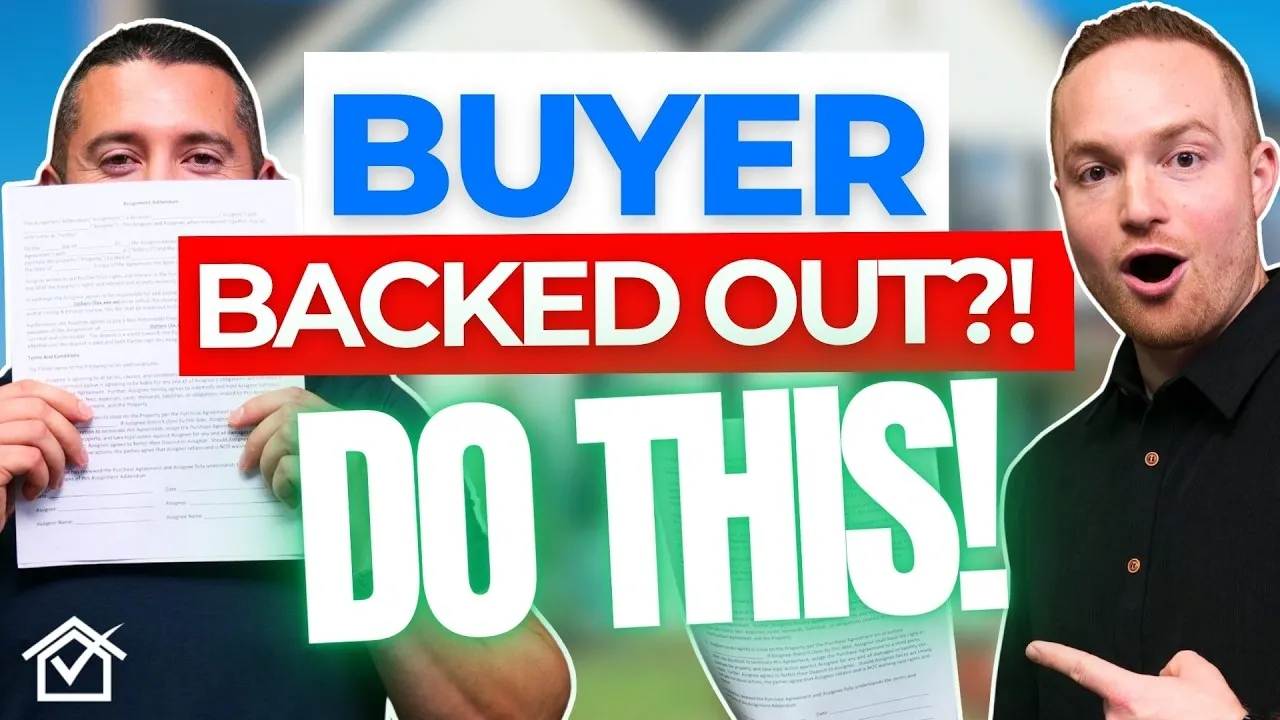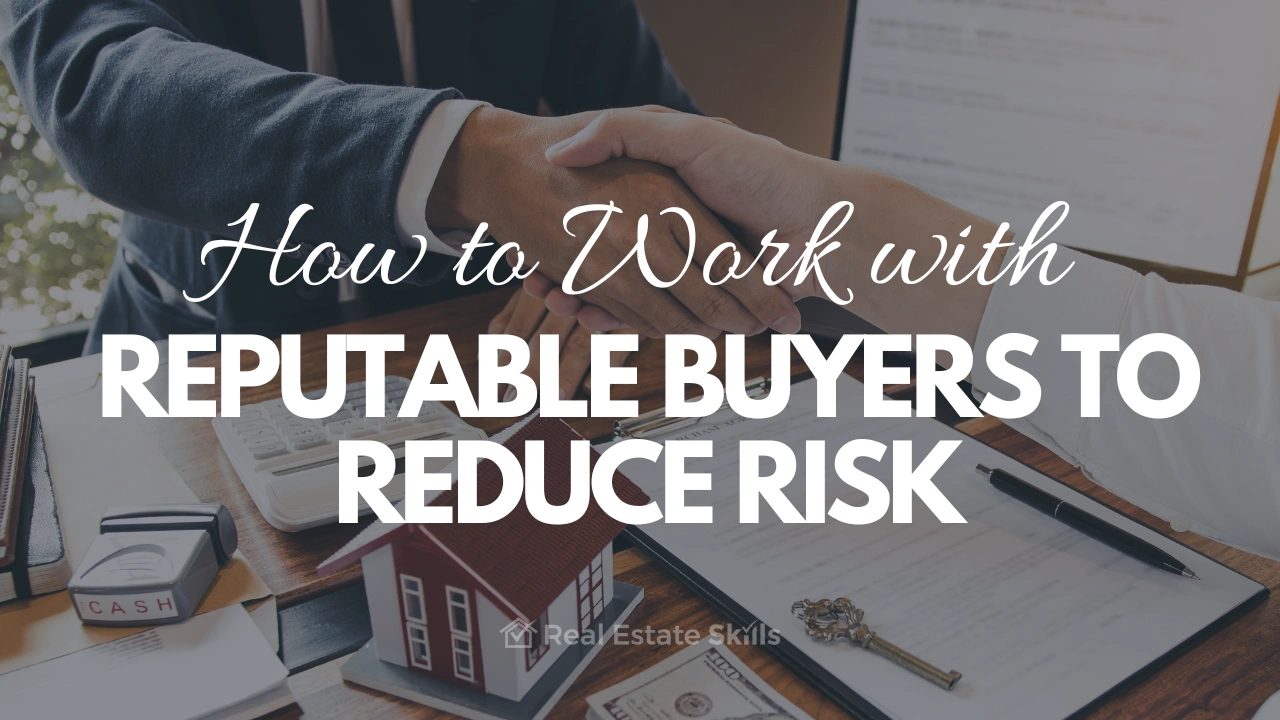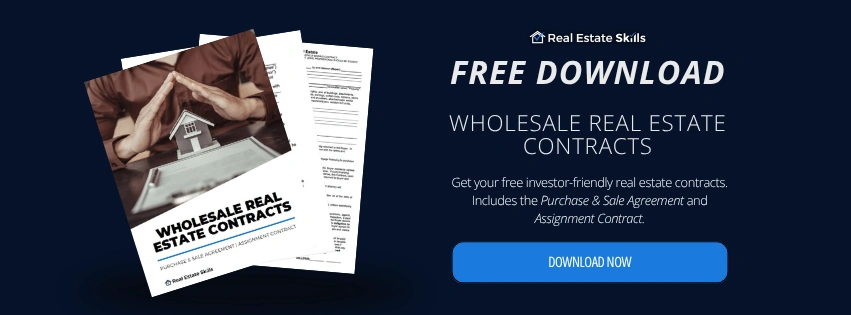Cash Buyer backs out of a real estate contract? DO THIS!
Jul 18, 2025
Before assigning contracts to buyers, it's crucial to understand the potential risks and how to protect yourself if something goes wrong. In this blog, you'll learn exactly what happens if a wholesale buyer backs out of a contract and how to avoid taking the hit.
Knowing how to structure your deals can make or break your success in wholesaling. That’s why we break down everything, from using non-refundable deposits to reduce fallout, to making sure you’re working with buyers you can actually trust. If you’re new to the game or just want to sharpen your process, this guide gives you real-world strategies to move forward with clarity and confidence.
Here's what we’ll cover:
- What Happens If an Assigned Buyer Backs Out Of A Contract?
- Why Your Contract Clauses Matter (Buyer Default)
- How Non-Refundable Deposits Protect You
- The Risk of Specific Performance Explained
- Why You Must Understand Your Contract
- How to Work with Reputable Buyers to Reduce Risk
- Why Relationships Matter in Wholesale Real Estate
If you’re serious about doing your first real estate deal, don’t waste time guessing what works. Our FREE Training walks you through how to consistently find deals, flip houses, and build passive income—without expensive marketing or trial and error.
This FREE Training gives you the same system our students use to start fast and scale smart. Watch it today—so you can stop wondering and start closing.
What Happens If an Assigned Buyer Backs Out Of A Contract?
Once a contract is assigned to a buyer, is the assignor still obligated to fulfill the terms of the original agreement if the assignee backs out? If the buyer gets assigned the contract but then backs out after the inspection period, does that mean the original wholesaler is obligated to purchase the property?
This is an important question—and a phenomenal one. Thinking a few steps ahead is key in this business. It’s kind of like playing chess. You want to understand your contract very well. That’s why we created an in-depth walkthrough video going line by line, to empower you to move with confidence and make offers with clarity.
Ultimately, what happens in the case of a buyer default depends on your purchase agreement. Suppose you’ve assigned your purchase and sale agreement to a new buyer and that contract is non-contingent—meaning the earnest money deposit is non-refundable—and the buyer doesn’t perform. In that case, that’s considered a buyer default.
Why Your Contract Clauses Matter (Buyer Default)
So, what happens to the wholesaler in this situation? Again, it comes down to what your contract says about buyer default.
In our assignment addendum, we transfer all rights, liabilities, responsibilities, and risks to the end buyer. That’s why it’s critical to have a rock-solid assignment addendum to protect yourself as the wholesaler. You want to ensure that your buyer is on the hook for all terms of the original contract.
That said, always proceed with caution, especially with your original purchase and sale agreement. Some agreements, like the Florida Realtor Purchase Agreement, include multiple checkboxes allowing the original buyer to choose whether they’ll be responsible after the assignment or not. That means the assignor may or may not be liable, depending on how the contract is structured.
Always revert to the actual contract. If you are liable, then your priority should be mitigating risk. As smart wholesalers and investors, we always want to protect our downside. These contracts involve real money, and you need to know what you’re risking.
Usually, that risk is limited to your earnest money deposit. This is known as the "liquidated damages" clause. If you default on the contract, the financial ceiling of your liability is typically limited to the amount of the earnest money. So, if your buyer defaults, the worst-case scenario is usually that the seller keeps that earnest money.
Read Also: For Sale By Owner Contract Guide + Free PDF Download
How Non-Refundable Deposits Protect You
To protect yourself in a situation like this, you should collect a non-refundable deposit at the time of assignment. That way, if the buyer defaults, their money is at risk, not yours.
Let’s say the buyer paid you more than your earnest money deposit. If they default, you get to keep the difference. That’s how our assignment agreement is structured. You might even profit on a deal that didn’t close.
That’s why we structure our deals so that when a buyer commits, they’re not just committing verbally—they’re financially locked in. The structure of our assignment addendum protects you even if you’re technically still liable under the original contract.
The Risk of Specific Performance Explained
There is a scenario where the seller could pursue what’s called “specific performance.” This is the legal route a seller can take to enforce the terms of the contract, essentially forcing the buyer to purchase the property.
Specific performance is the worst-case scenario. In the Florida contract, for example, the seller is given the option to either take the earnest money as liquidated damages or pursue legal action to enforce the contract.
That said, it’s extremely rare. We've talked to numerous attorneys about this, and almost all of them say it’s unlikely a seller will pursue specific performance. Most sellers would rather take the earnest money and find a new buyer.
So in reality, the risk is very minimal. That’s also why we feel comfortable entering contracts where we might still technically be liable, as long as we’re protected by collecting a deposit from the end buyer.
Why You Must Understand Your Contract
It’s crucial to understand your contract. Whether you're using an on-market contract for your state or an off-market one, the contract is the law of the land. It defines the terms everyone has agreed upon.
We often get contract questions from students, but we haven’t even seen their contracts, so we can’t advise them properly. It might sound boring, but you absolutely must read and understand the contract you're using.
My advice? Grab a couple of coffees and head to Starbucks. Take time to read the contract thoroughly. Understand it like the back of your hand. They’re usually straightforward once you put the time in.
What you agree upon in the contract is what governs the deal. It’s all about mitigating your risk from the beginning.
Read Also: How to Flip Real Estate Contracts?

How to Work with Reputable Buyers to Reduce Risk
Another way to mitigate risk—besides having a bulletproof contract—is to work with reputable buyers. Don’t assign deals to random buyers you’ve never met, just because they emailed you or showed interest online.
Find buyers with a strong track record. Look for those who have closed on past transactions and want to build a working relationship. The best cash buyers understand contracts and want to close because they know that when they do good business with you, you’ll bring them more deals.
Too many people waste time worrying about "what-ifs." A lot of those concerns disappear when you’re working with solid cash buyers. And don’t wait until you have a deal under contract to start building your buyer list.
Read Also: How To Find Cash Buyers For Real Estate & Build Your List
Why Relationships Matter in Wholesale Real Estate
You want to avoid scrambling to find a buyer at the last minute. That’s when things get dicey. Don’t wait until the last day of a contingency period to throw the contract out and hope someone picks it up.
Instead, build relationships with your buyers ahead of time. Understand their criteria and build rapport. That way, when you go into a deal, you already have a high likelihood of closing.
It’s one of the smartest and strongest ways to mitigate risk in wholesale real estate. Work with buyers who will do what they say they’ll do. The buyers we work with at Real Estate Skills are reputable. When they say they’re going to perform, we trust them.
Of course, we still sign contracts because the title company needs them to facilitate the transaction. But those relationships matter. We pride ourselves on working with buyers who consistently close and are always looking for great deals.
These are trustworthy people who do what they say they’re going to do. When you work with those kinds of buyers—and get everything in writing—you can move forward with confidence, knowing the deal will close.
If you’re serious about doing your first real estate deal, don’t waste time guessing what works. Our FREE Training walks you through how to consistently find deals, flip houses, and build passive income—without expensive marketing or trial and error.
This FREE Training gives you the same system our students use to start fast and scale smart. Watch it today—so you can stop wondering and start closing.
*Disclosure: Real Estate Skills is not a law firm, and the information contained here does not constitute legal advice. You should consult with an attorney before making any legal conclusions. The information presented here is educational in nature. All investments involve risks, and the past performance of an investment, industry, sector, and/or market does not guarantee future returns or results. Investors are responsible for any investment decision they make. Such decisions should be based on an evaluation of their financial situation, investment objectives, risk tolerance, and liquidity needs.






